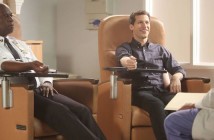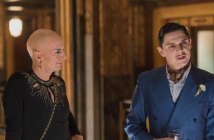Masters of Sex, Season 2, Episode 10, “Below the Belt”
September 14, 2014, 10:00 p.m. (EST), Showtime
Bill Masters is afraid of himself. He’s afraid of the darkness at his core. He is afraid he’s so broken he cannot be fixed. This is what makes him so fascinating a figure to put at the center of a series. He also lashes out to cover for his own pain—he wants to spread the misery around thick enough that no one notices just how much he’s wading in. This makes him very difficult to root for. He fits in fairly comfortably with the long line of antiheroes who have anchored prestige dramas over the past decade or so. On his own, Bill Masters is compelling, but incredibly frustrating. Ironically, in an episode about how unfair it is to put the burden of fixing his problems on Virginia, Masters of Sex makes clear that it is her capacity to “save” Bill Masters that keeps me coming back to this show, even in this troubled second season. When this is a show about Bill Masters, petulant sufferer, it can feel same-y, like we’ve seen it all before. When it is about two troubled people trying to find their way out of the darkness, it can be something truly great.
“Below the Belt” spends too much time allowing Bill to wallow before it finally hits the breakthrough that might begin to change things. The fist fight with Francis, and all of the verbal lacerations that lead up to it, is some fantastic work from Michael Sheen, but it’s also underlining a point this show, and this season, has been making again and again and again (when it isn’t watching Austin peddle diet pills for reasons that make increasingly little sense to me): Bill lives in a constant state of self-denial. It is at the root of all of his problems. He drapes himself in so many layers of obfuscation, he can’t even see himself. That’s the way he likes it. This is an interesting point the show makes well. It’s just also a point the show makes well a lot.
Bill’s redemptive quality is, in theory, his brilliance, but after a few early episodes traded in cases of the week, we have started to lose sight of the one thing that ensures people will put up with his horribleness. Bill shouts about wanting the Nobel Prize, but ultimately, his ideas are innovative purely as a matter of timing. Bill has done good research, but his stroke of genius was just deciding to research human sexuality at a point where very few scientists had broached the subject. It appears this season is about a rut in the Masters and Johnson partnership, and while that is important and potentially interesting, in execution it hasn’t proven particularly fruitful.
If there is an overarching narrative to this season beyond the feeling that the study has become rudderless, it is the half-hearted exploration of inequality in America the show has tried in several ways to attack, without ever really landing on anything that works. Libby’s work with the Civil Rights movement has always felt more about trying to do some character work with Libby, though the show has never landed on exactly what it is hoping to say about her. The Buell Green material was gangbusters, but the show cut and ran from that in favor of a story that underlines inequality by having characters constantly say things about inequality. The show could be contrasting this with Bill Masters’ seeming ability to get by without a win for years just by being a white guy, but I have to stretch to place that reading coherently on top of this season, which increasingly feels completely at a loss to say anything about its characters or the world they live in that we haven’t heard before.
If “Below the Belt” has anything that works, it’s the scenes with Virginia and her therapist, where he confronts her for the way she lies to herself, the stories she tells to live with her choices. This is a flaw she and Bill share, even if she is more perceptive about it, and the show is smart to shove in both characters’ faces the stories they tell themselves and how convenient that makes their various justifications. In the morass of subplots, there starts to appear a vague throughline, if you look at them properly. Cal-O-Metric, Barbara and Lester, Francis’ alcoholism—all are stories about people trying to lie to themselves, and the lies slowly becoming unraveled. But also, all are stories about deeply troubled people crawling their way toward betterment, learning to recognize their flaws and working to be better. None of it is really working, all of it is messy and uncertain and halfhearted. But at its core, there is still something admirable about what the show is trying to say about the lies we tell ourselves and the way we might dismantle them. I just wish it would say it more coherently.
The Roundup
- “I’m broken. And you…you’re the only one who can fix me.”
- “If I’ve learned anything, its that everyone has their own version of everything.”
- “You make movies?” “I prefer to think of it as telling the truth 24 times a second.”
- “You can’t operate on the soul. Only God can do that.”
- “People need to believe in something. They need to find meaning in something.” “The second law of thermodynamics is pretty good. And pretty irrefutable.”
- “Greatest sin, right?” “Maybe it doesn’t have to be.”
- “I abandoned him to that…monster. And then I punished him for it. What is wrong with me?”
“Below the Belt” spends too much time allowing Bill to wallow before it finally hits the breakthrough that might begin to change things.
-
MEDIOCRE




